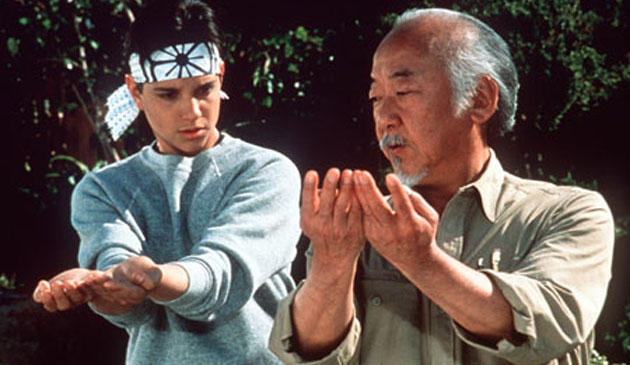The journey is unique to each person. Teachers help reveal common guideposts and pitfalls

Mindfulness. Pretty sure you’ve heard of it. It’s all the rage. Even the cows and chickens are sitting criss-cross-apple sauce getting their Zen on. This hyperbole is meant to deliver a single point: because “mindfulness” is so well-known, what it actually is has been diluted and broken apart. No offense to the cows and chickens.

Which brings us to the Karate Kid: if a person wants to learn to defend themselves, they seek a teacher. There have been a few renditions of the movie, but I’ll confess Mr. Miyagi is my favorite. “Wax on. Wax off,” Mr. Miyagi said to his student, Daniel, as he was waxing Mr. Miyagi’s car. Those simple movements, though Daniel didn’t intellectually understand their “why,” were already training Daniel’s mind and body to learn to block. But it wasn’t just about repeating movements. Sure, if YouTube was around at that time, Daniel could have picked up some of his own bag of tricks, but there’s more to learning from someone than just copying movements.
Now, I’m not going to wax philosophical about the nuances of martial arts, but I will say it’s a pretty deep rabbit hole and there’s more than just rabbits in there. The thing about learning in relationship with someone who serves as a teacher or facilitator is that that teacher comes to understand and empathize with their student. In such a dynamic, that teacher can both see what the student cannot and create connections through the student’s strengths.
I have to pause here for a moment to put the spotlight on an important piece of guidance I’ve heard countless times: “be your own guru.” It’s a simple phrase. And one enterprising fellow released a documentary centered around this in 2011 called Kumaré wherein he pretended to be a guru from India, replete with a fake Indian accent and his own religious symbol. Watch it, it’s great. But it’s important to understand what this is and is not saying. It is saying that whatever lessons one learns, for there to be true learning, must become more than just rote memorization. What it is not saying is to avoid either learning from others or seeking a proper teacher or guru. Any teacher or guru worth their salt will do their best to encourage their students to become their own pillars of strength and understanding, so that there is not a long-term dependency upon the teacher or guru to be their guide for all things.
The tricky part, now, is finding the right teacher. Spoiler: even Daniel left Mr. Miyagi to learn from Cobra Kai at one point. There are plenty of teachers to shuffle through and plenty amongst them who are self-proclaimed gurus or coaches. It’s a lot like dating. (I wouldn’t be surprised if there were a Tinder for mindful teachers. Buddha? Swipe right!) Buddha, by the way, also had this dating challenge before he became the Buddha. Not all his teachers were into self-mutilation, but he did find himself amongst various practitioners of the time practicing forms of austerities that instructed him to literally starve himself and to inflict intense physical harm so that he may conquer suffering. But then he was like “Nah, that’s not the way,” and he dropped it like a bad habit despite what all of his homies were saying about him. He had several teachers, not all of which were into these austerities, and he let himself come to determine what felt most right and what did not. One of Buddha’s principals was to let your own experience help you determine what’s true rather than doctrine or what others say.
In this age, there’s plenty you can do and learn on your own. If you find yourself confused about something, stuck in a rut, unable to make the time, or wondering if mindfulness is even for you, then it’s worth considering reaching out to someone who may be able to offer some guidance. Some teachers are willing to provide some guidance for free, especially because mindfulness should be accessible to everyone. More so, having a teacher means building regularity and accountability into your mindfulness practice. That can be extra helpful when you find you keep falling into the same patterns when going entirely solo.
Takeaway
Teachers, even ones you don’t connect with, are catalysts for your learning. And while the land of mindfulness is unequivocally a unique journey for each of us, there are many common guideposts and pitfalls. The right kind of teacher will help you learn to see, in the ways unique to you, where those guideposts and pitfalls are. Put another way, a real teacher helps you become your own teacher.
